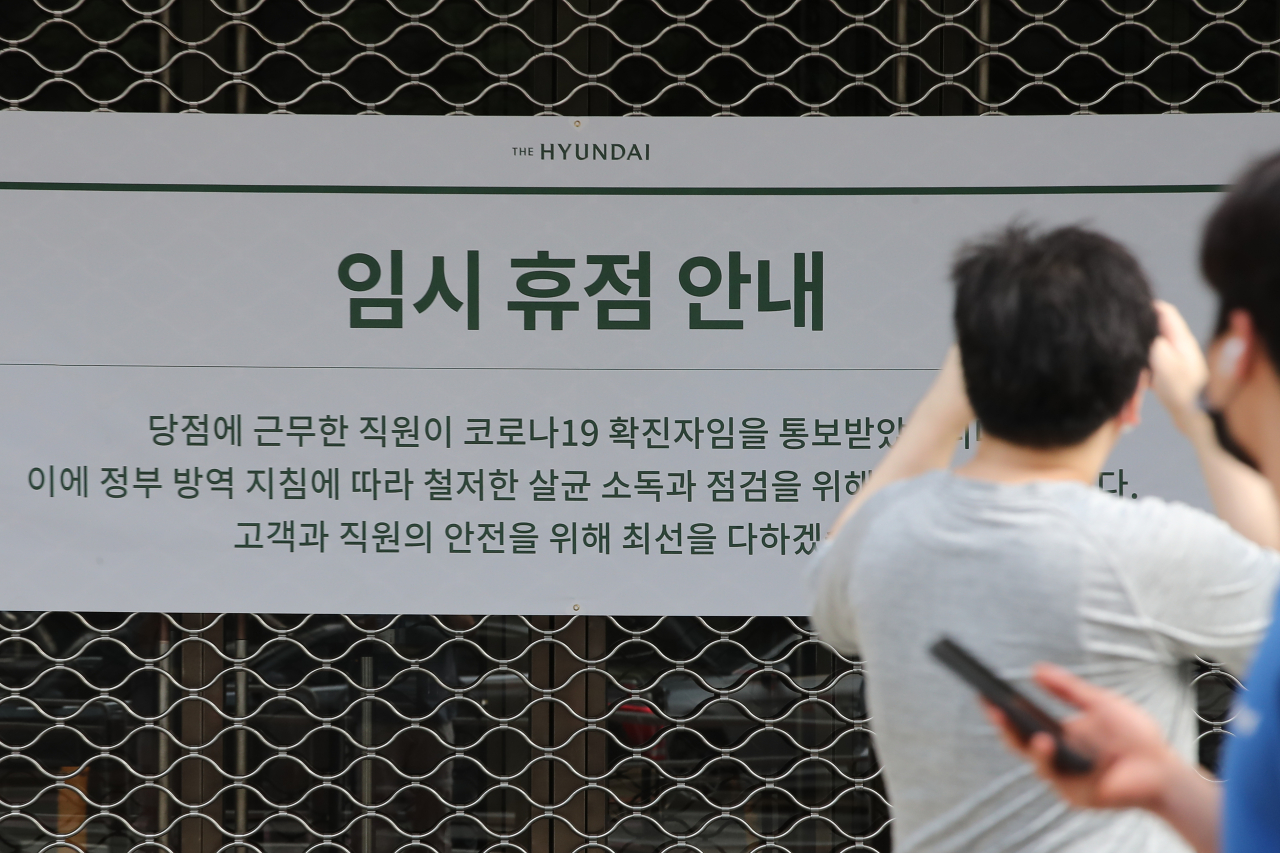After a cluster of COVID-19 infections was reported at a department store in Seoul, large retail outlets are fearing it will cause a ripple effect and scare shoppers away.
As of Sunday, nearly a week after the first infection was identified at Hyundai Department Store’s branch at Coex, Gangnam, at least 118 cases have been found to be linked to the store.
The first patients were two staffers who tested positive on July 4. They worked on the basement floor, where the supermarket and food court are located. Hyundai Department Store closed the following day. It cut short its opening hours the day after, and as virus cases continued to rise, decided to halt operations until Monday.
The Seoul Metropolitan government said the store did not break any virus prevention measures, including regular disinfections. The virus, however, appears to have spread among workers, who shared meals and did not wear masks in break rooms. They continued to work even though they showed signs of a mild fever.
Health authorities sent out a message to all residents of Seoul and its surrounding areas saying that anyone who had visited the department store between June 26 and July 6 should get tested. The number of visitors could easily be in the tens of thousands.
Unlike regular restaurants and shops, department stores are an exception to the commonly-used QR-based visitor log system, which made contract-tracing impossible.
“During the temporarily shut down period, we have worked closely with health authorities and have taken strict disinfection measures,” a Hyundai Department Store official said.
“We will do our best to keep our staff safe. All staff working in the food court and grocery store on the floor will be put into quarantine for two weeks regardless of their test results.”
Lotte Department Store also closed the first and basement floors of its branch in Yeongdeungpo, western Seoul until Monday, after two of its employees were confirmed to have been infected on Sunday.
The retailer said all of the staff who worked on the floors are getting tested for coronavirus.
Shinsegae Department Store also temporarily shut down a shop inside its Jukjeon branch in Gyeonggi Province, after an employee tested positive.
Following the discovery of the Hyundai cluster, department store operators saw their sales decrease over the weekend.
According to industry observers, Lotte Department Store saw its sales go down by 6.4 percent over the weekend, compared the weekend prior. Sales from cosmetics and food sectors showed the biggest drop of 23.9 percent and 16 percent, respectively.
Hyundai Department Store also suffered from a sales drop of 16.1 percent over the weekend and the figure also went down for Shinsegae Department Store by 1.3 percent.
As virus-wary customers shun brick-and-mortar stores, grocery e-commerce platforms are seeing a jump in sales.
SSG.com, the online shopping platform run by Shinsegae Group, said its sales grew 15 percent on Saturday and Sunday, when compared to the figure recorded a week earlier. Sales of hand sanitizers and masks jumped by 143 percent and 48 percent, respectively, as convenient meal kits, instant noodles and bottled water were also popular, with their sales increasing by 14 percent, 20 percent and 14 percent, respectively.
Market Kurly, a grocery e-commerce platform, said its number of orders increased by 12 percent over the weekend, when compared to June 26 and 27.
By Jo He-rim (
herim@heraldcorp.com)








![[Today’s K-pop] Blackpink’s Jennie, Lisa invited to Coachella as solo acts](http://res.heraldm.com/phpwas/restmb_idxmake.php?idx=644&simg=/content/image/2024/11/21/20241121050099_0.jpg)